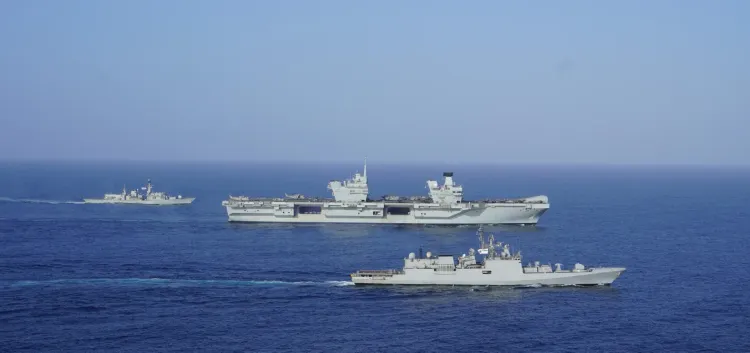Did the Indian and UK Navy Conduct a Joint Exercise in the North Arabian Sea?

Synopsis
Key Takeaways
- Strengthening collaboration between the Indian and UK Navies.
- Focus on maritime security and freedom of navigation.
- Demonstration of operational readiness through complex drills.
- Addressing regional challenges posed by the Chinese Navy.
- Importance of rules-based international order.
New Delhi, June 11 (NationPress) In a significant exhibition of naval prowess, the Indian Navy and the Royal Navy of the United Kingdom executed a high-octane Passage Exercise (PASSEX) in the North Arabian Sea.
This vital maritime drill, carried out on June 9 and 10, featured the Indian Navy's stealth frigate INS Tabar, a conventional submarine, and the long-range maritime reconnaissance aircraft P-8I.
On the UK side, the exercise included the deployment of the UK Carrier Strike Group, which comprised HMS Prince of Wales and HMS Richmond.
The two-day comprehensive naval exercise encompassed a variety of maritime drills, such as synchronized anti-submarine warfare operations, professional exchanges of officers, coordinated helicopter control, and tactical maneuvers.
These intricate operations in the North Arabian Sea underscored the increasing synergy between the two navies in upholding operational readiness and domain awareness.
The PASSEX exercise stands as a testament to the strengthening maritime collaboration between India and the UK, which ensures the freedom of navigation, maritime security, and adherence to a rules-based international order at sea, reflecting the growing alignment between New Delhi and London on crucial strategic matters.
As global maritime challenges become more intricate with the ascendance of the Chinese Navy in the region, the partnership between two like-minded democratic nations, India and the UK, becomes increasingly vital.
This essential collaboration highlights the robust relationship between the two navies and their commitment to maintaining a secure and stable maritime environment.
The joint drill occurred in the wake of the Pahalgam terror attack in May 2025, which resulted in over two dozen casualties, followed by a four-day conflict between India and Pakistan.
During this four-day conflict last month, the Indian Navy mobilized its carrier battle group in the Northern Arabian Sea, maintaining full combat readiness.
"In light of the despicable attacks on innocent tourists at Pahalgam in Jammu and Kashmir by terrorists backed by Pakistan on April 22, the Indian Navy's carrier battle group, surface forces, submarines, and aviation assets were swiftly deployed at sea in full combat readiness," stated Vice Admiral A.N. Pramod last month.









